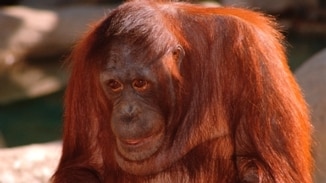
Orangutan Picks Cocktail by Seeing Ingredients
猩猩通过识别成分选择鸡尾酒
An orangutan matched researchers’ predictions about which mixed beverage he would choose based on his relative fondness for the separate ingredients.
如同研究者们预测的那样,对于混合饮料,一个猩猩可以根据喜爱的成分来做出选择。
撰文/播音:杰森·戈尔德曼(Jason G. Goldman)
翻译:郭鑫鹏
审校:丁可含
Imagine you had never tasted lemonade. You would still probably assume that lemon juice mixed with sugar tasted better than lemon juice alone. Because you know what lemon tastes like, and you know what sugar tastes like.
想象你从来没有喝过柠檬汽水。你依然可以认为加糖的柠檬汁比纯柠檬汁更好喝,因为你知道柠檬和糖分别是什么味道。
You can recall those past experiences, and make a prediction about your response to something new. Researchers call the ability to predict our future emotional state “affective forecasting”. And some have suggested that the skill is unique to humans. But is it?
你可以回忆那些过去的经历,然后预测你对一个新事物的看法。研究者们将这个预测未来情绪状态的能力称作“情感预测”。一些人认为这项技能是人类独有的。真的是这样吗?
“We combined different liquids and asked participants, the orangutan and the humans, to predict how such novel liquid combinations taste like, and whether they prefer one or the other.” Lund university cognitive scientist Gabriela-Alina Sauciuc.
“我们混合不同的液体成分然后询问参与者们,包括猩猩和人类,让他们预测这些混合液体的味道,然后问他们喜欢哪一种。”隆德大学认知科学家加夫列拉·阿林娜·萨乌丘克说。
She and her colleagues offered their cocktails to a 21-year-old male Sumatran orangutan named Naong, who lives in Sweden’s Furuvik Zoo. They used four ingredients-cherry juice, rhubarb juice, lemon juice and diluted apple cider vinegar-which they combined into six unfamiliar mixtures. Altogether, that made for 24 possible comparisons of one drink against another.
她和她的同事们把鸡尾酒提供为一个生活在瑞典菲吕维克动物园叫Naong的21岁雄性苏门答腊猩猩。他们使用包含樱桃汁、大黄汁、柠檬汁和稀释苹果醋等4种成分,组合成6种陌生的混合物。以两种混合饮品为一组,共计24组。
Naong watched the researchers mix his drinks. Then he got to choose from the two set before him. And in 21 of the 24 trials, Naong matched the researchers’ predictions: that his choice would be based on his relative fondness for the separate ingredients. [Gabriela-Alina Sauciuc, et al., Affective forecasting in an orangutan: predicting the hedonic outcome of novel juice mixes, in Animal Cognition]
Naong观察研究者们混合它的饮料。然后它在其中某组的2个中做选择。在24次实验中的21次,都同研究者的预测一样,Naong的选择基于他对于个别成分的喜好。
For example, since he liked rhubarb juice better than lemon juice, he also preferred rhubarb-cherry juice to lemon-cherry juice-despite having had no experience with either.
比如说,它比起柠檬汁更喜欢大黄汁,它就比柠檬-樱桃汁更喜欢大黄-樱桃汁。尽管它对这些没有任何经验。
“We were impressed with Naong’s ability to be so consistent in his choices.”
“我们对于Naong的选择能保持一致性这项能力感到惊讶。”
From a statistical perspective, the orangutan data was indistinguishable from human data. Both species seemed to make consistent choices about future events even if they had no prior experience to guide their decision-making.
从统计学的角度来说,猩猩的实验数据和人的实验数据完全一致。两个物种都针对未发生的事件做出了前后一致的选择,即使他们没有经验作为他们决策的依据。
“An ability which was previously thought to be uniquely human presumably has evolved earlier, so that it’s shared with orangutans and presumably with chimpanzees as well.”
“这样一个之前被认为是人类进化而得的独有能力,现在我们看到猩猩也有这项能力,甚至可以推测黑猩猩也具有。”
It’s a single study with a single orangutan. But it may be that we will soon mark yet another skill off the list of things that were once thought to be the sole domain of our species. Perhaps what’s truly unique about us is our ongoing quest to find something unique about us.
这是一个独立的研究,实验者只有一个猩猩。但是我们也许很快会将一个又一个我们认为的人类独有能力移出列表。可能我们拥有的真正独一无二的是,我们对于寻找人类独特之处的追求。
-Jason G. Goldman
原文链接:
https://www.scientificamerican.com/podcast/episode/orangutan-picks-cocktail-by-seeing-ingredients/
(题图来源:http://www.scientificamerican.com)